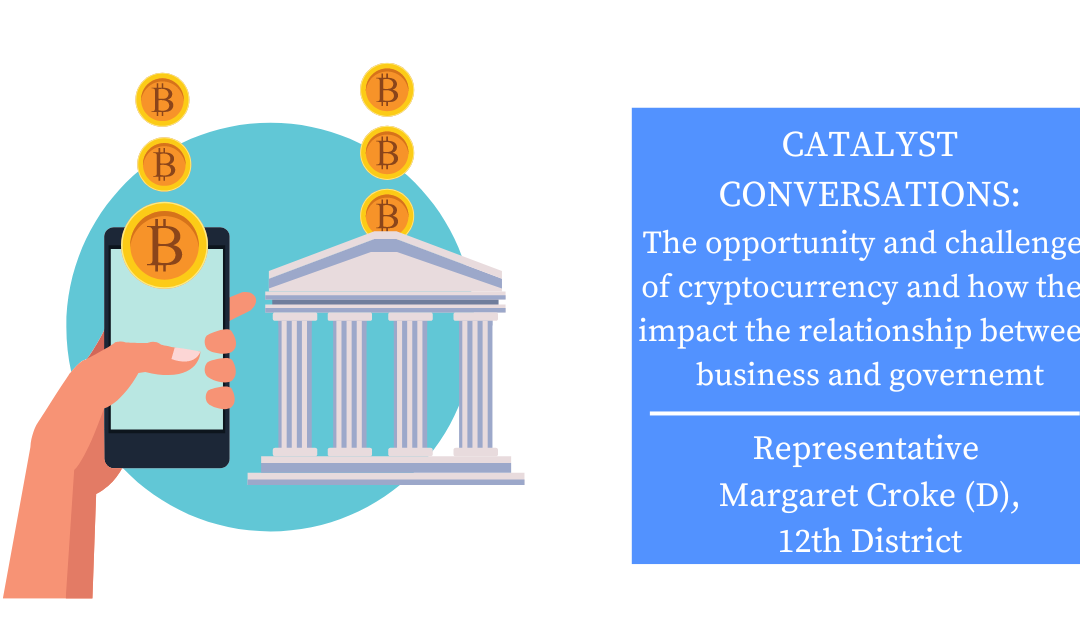CATALYST CONVERSATIONS: Building Bridges: Exploring how Government and Tech can Grow Forward Together
From one of the Midwest’s largest cryptocurrency mining facilities to a Chicago-based Bitcoin ATM operator, Illinois is becoming fertile ground for the fast-growing digital asset industry, which has developed from an arcane concept into a booming investment in a little over a decade.
Rep. Margaret Croke has been a champion of HB3968, which creates a Special Purpose Trust Company making digital assets a part of Illinois’ financial services future. It will create a stable regulatory environment where businesses in Illinois have the ability to bank digital assets. The bill passed the Illinois House unanimously, bringing Illinois one step closer to being the national leader in fintech.
Prior to being elected to represent Illinois’ 12th legislative district, Representative Margaret served as Deputy Chief of Staff for the Illinois Department of Commerce and Economic Opportunity (DCEO). In that position, Representative Croke managed a multitude of projects on behalf of the Director, was a lead liaison to the Governor’s Office, and was Treasurer to the Broadband Advisory Council.

Rep. Margaret Croke, 12th District
When you first started considering a run for office did you feel as though the areas of policy you specialize in, technology based economic development, would be your bread and butter?
What I was interested in had to do with my background at the Department of Commerce and Economic Opportunity. I am a huge advocate for figuring out how we, in the government, support emerging industries in the state of Illinois. How do we make Illinois a state that businesses are considering as somewhere they want to locate? We’ve got the workforce. We’ve got the infrastructure.We’ve got the tax incentives. How do we promote those things? That is where I have focused my efforts.
You were on JB Pritzker’s transition team, which I’m sure gave you a great idea of how future forward you had to strategize – what initiatives were you working on and what eventually propelled you to take on the next chapter of running for the House of Reps?
I really took an interest in the Department of Commerce. One of my mentors is deputy governor or former deputy Governor Dan Hine. He was the head of budget and economy for the governor for two years, and really helped me get to where I wanted to go. But what I find so interesting is that government and business don’t speak the same language. We don’t seem to be able to work in sync together.
I’m a government person. I understand how the government works. I worked in the city, the state, the county, and I know how they think. And what I have tried my best to do is engage in conversations with associations, stakeholders, private companies, and figure out what do they need from the government, what do we need from them, and how can we start a better relationship between the two? That’s what has really been driving me.
I wanted to be the elected official who is going to take on those initiatives and who is going to focus on what the business community needs, what the tech industry needs, and is willing to learn how to do it in a way that is sustainable.
“ We need to work collaboratively together to advance policy that is backed by programming and infrastructure that will allow emerging industries like Fintech to thrive in Illinois.”
One of those emerging industries that is talked about often in Illinois and talked about across the nation is cryptocurrency and blockchain. We wanted to give you a chance to dive into those industries and exactly how the legislature is adapting to provide a business environment conducive towards promoting growth in those industries.
Blockchain and crypto are not the same thing. Obviously you can’t have cryptocurrency without blockchain technology, but blockchain technology is kind of the foundation and it allows for crypto to exist. And what a blockchain is, it’s just a decentralized, distributed ledger. There are a lot more implications for blockchain. For instance, we’re looking at blockchain when it comes to the supply chain because blockchain can have a bunch of smart contracts on it, which means like I can get from A to Z without having to talk with anyone as long as the various systems are working together.
Crypto is the most shiny thing that we’ve done with the blockchain technology. What we’re looking at, from the state level, is now how do we allow blockchain companies and these financial technologies to continue to grow? How do we regulate this industry without putting it under so much red tape that they can’t come out? I’ve looked at various ways we can do some banking charters, specifically a special purpose trust company. And the other thing we’ve looked at briefly was whether or not the state could accept payments through these alternative channels.
So when it comes to the use case for cryptocurrency and communicating that to underserved, underbanked communities, what has that conversation look like?
When it comes to the underbanked and unbanked, the reason I got so interested in crypto was a use case study from Venezuela where crypto at that time was more stable than the government fiat currency. There was this idea that as you had people leaving the country, their wealth no longer had to be on their physical person. It could exist in “the cloud”.Using a blockchain distributed ledger immutable ledger, the money follows the person. It does not have to be physically on you. It doesn’t have to be in a bank in that country where you are located, not like in America, where you have all these rules and regulations to make sure that the bank can’t just say, “Oh, sorry, we lost all your money.That’s very different in other countries. So that’s what I found really interesting is this idea of someone being able to move their physical location, but then also having their wealth stored in a decentralized, immutable ledger that was not held by any individual government, could not be seized by any individual government.
I also find it really interesting in cases regarding people who have maybe recently immigrated to America, using crypto to send money overseas without any type of delay. It’s crazy to me that bank transfers still take up to three business days in some cases without any fees. Every time you delay these transactions, it has a real impact on these individuals. These individuals don’t have a bank account or they haven’t totally established what their financial infrastructure in our country is going to look like.So those are the things I was thinking concerning crypto in some of the use cases.
Would you say that there are still people in the state legislature that have some apprehensions about blockchain? Do you notice those apprehensions easing more in recent years as this has become a little bit more mainstream?
Almost every week there’s a story in which crypto funds are seized. So there is a lot of apprehension there. What I try to lead with in the conversations with my colleagues, even if they’re not willing to totally learn the technology or its implications or anything like that, is that I’m promoting regulation. Those regulation bills are supported by industry and they’re supported by the regulators, the people who actually do the audits. Regulation equals stability and that makes people feel better because right now we’re operating in a state system in which there isn’t any. And honestly, until recently, at the federal level, there wasn’t any. And there still is a lot of gray area there. I lead with regulation because in government, everyone wants regulation, so it’s a foot in the door. They want smart regulation, and they want regulation done by someone who actually is trying to understand the needs and the wants of a very interesting, growing, vibrant industry. And we could have that industry in Illinois.
How do you think the state can help soothe some of those concerns that the average consumer may have? Could you offer up any insight on some potential solutions that are coming out of the legislature here in the next few years or even this coming legislative session?
I can’t control the volatility of cryptocurrency. I don’t know if anyone wants me to because when it’s high is high, and when it’s low, it’s low. What I try to tell people about what concerns me is I compare cryptocurrency more to an asset than actually like a currency itself. What I care about is making Bitcoin an actual tangible thing.Ideally, if you’ve got Bitcoin and want to be able to put that Bitcoin in a deposit box, I want you to be able to do it the same way you would put a bar of gold in a deposit box. And I want to make sure that that Bitcoin is safe, meaning that you can go to that banking institution at any point in time, be able to withdraw and take away your bitcoin. That’s what I want to make sure happens. What I don’t want to happen is that you put your Bitcoin into the safe deposit box and it gets taken away from you. We want to make sure it’s safe, it’s insured, and i’s not able to just collapse. What I can’t control, though, is while that Bitcoin is sitting in its safe deposit box, how much that Bitcoin is going to be worth. In the same way I can’t control how much a bar of gold is worth.
The second thing is the environmental impact that cryptocurrency has, which is significant. So there are two different types of mining I want to mention. There is proof of work and proof of stake. Proof of work requires way more energy than proof of stake. Proof of work is like a bunch of computers have to figure out a problem. And in the process of figuring out that problem, they use a massive amount of energy. Bitcoin is a proof of work. Cryptocurrency like Ethereum is a proof of stake. And it requires one fourth of the energy. Let’s talk about the energy impact. I can’t control if in China, a bunch of mining companies decide to locate next to a nuclear power plant because I have no regulation over that. But what I can make sure of, is that if we have any companies that do mine for crypto, if they come to Illinois, that there is a renewable energy requirement that they have to meet. We’re talking about tax incentives very similar to the data center tax incentive that we have at the state level around mining. But I would be much more aggressive about the renewable energy component in a crypto mining center because they even take more energy than a data center for the most part. That’s the next frontier, in my opinion, is making sure that we are being thoughtful about the energy use that a cryptocurrency requires.

